 Your new post is loading...
 Your new post is loading...

|
Scooped by
Gust MEES
|
Ist die klassische Berufsausbildung überholt? Um die Ausbildung flexibler gestalten zu können, könnten 36 Level statt drei Ausbildungsjahre eingeführt werden.
Die Digitalisierung erhält immer schneller Einzug in die Ausbildungswelt. Azubis können sich ihre Arbeitsanweisungen mittlerweile aus der Cloud ziehen, Maschinen schon lange mit Tablets bedienen und in sozialen Netzwerken lernen. Und auch die Berufsbilder bleiben vom digitalen Wandel nicht unberührt. Doch nicht allen geht die Transformation von alter zu neuer Ausbildungswelt schnell genug.
Das neue Ausbildungsjahr beginnt zumindest schon ganz im Zeichen der Digitalisierung. Zum 1. August können sich junge Menschen bundesweit erstmals zum Online-Händler ausbilden lassen. "Kaufmann/Kauffrau für E-Commerce" heißt das neue Angebot offiziell. Es soll eine Antwort auf den seit langem boomenden Onlinehandel sein. Eine Antwort, die zehn Jahre zu spät kommt, kritisieren Experten denn auch – und wünschen sich mehr Schnelligkeit in Sachen Digitalisierung. Nichts anderes als die Zukunftsfähigkeit Deutschlands stehe auf dem Spiel.
"Die Ausbildung kommt nicht zehn Jahre zu spät, sondern genau rechtzeitig", sagt dagegen der Vizechef des Bundesverbands E-Commerce und Versandhandel Deutschland, Martin Groß-Albenhausen. Weil sie Fachkräfte forme, die vielleicht das "nächste große Ding im Handel" umsetzen würden. "Wir haben einen Beruf geschaffen, bei dem wir am ersten Tag der Ausbildung jedem Azubi sagen, dass er am Ende der drei Ausbildungsjahre vermutlich einiges, was er in den ersten Monaten lernt, nicht mehr anwenden wird." Der Handelsverband Deutschland geht von mehr als 1000 Onlinehandel-Azubis in diesem Jahr aus. Learn more / En savoir plus / Mehr erfahren: https://www.scoop.it/t/21st-century-learning-and-teaching/?&tag=rubric

|
Scooped by
Gust MEES
|
In den USA wurde vor kurzem die Netzneutralität abgeschafft. Das zuständige Gremium, die FCC, hat seine Regeln diesbezüglich zurückgenommen. Unter Präsident Obama war die Netzneutralität nämlich eigentlich verankert worden – sein Nachfolger bzw. dessen FCC-Chef hat dies Ende letzten Jahres rückgängig gemacht.
Doch was heißt das eigentlich? Im "Urzustand" des Internets, so wie es seit seinem Beginn funktionierte, werden alle Datenpakete gleich behandelt. Das heißt, dass eine private E-Mail genauso schnell oder langsam durch die Unterseekabel reist wie beispielsweise ein Video einer Streaming-Plattform oder ein Telefonat mit einem Messenger. Seitens der Netzbetreiber gibt es seit langem Bestrebungen, diesen Zustand zu beenden. Sie könnten dann sowohl die Betreiber von Webseiten und Diensten zur Kasse bitten – als auch ihre Nutzer. Wer ruckelfrei Netflix oder Youtube schauen will, müsste dann ein spezielles „Streaming-Paket“ bezahlen. Gleichzeitig könnte ein Internet-Provider aber auch einen Deal mit einem Streaming-Dienst eingehen und dessen Mitbewerber künstlich verlangsamen. Learn more / En savoir plus / Mehr erfahren: https://www.scoop.it/t/securite-pc-et-internet/?&tag=net+neutrality https://www.scoop.it/t/securite-pc-et-internet/?&tag=Netzneutralit%C3%A4t

|
Scooped by
Gust MEES
|
As the teaching professions face rapidly changing demands, educators require an increasingly broad and more sophisticated set of competences than before. In particular the ubiquity of digital devices and the duty to help students become digitally competent requires educators to develop their own digital competence. On International and national level a number of frameworks, self-assessment tools and training programmes have been developed to describe the facets of digital competence for educators and to help them assess their competence, identify their training needs and offer targeted training. Analysing and clustering these instruments, this report presents a common European Framework for the Digital Competence of Educators (DigCompEdu). DigCompEdu is a scientifically sound background framework which helps to guide policy and can be directly adapted to implement regional and national tools and training programmes. In addition, it provides a common language and approach that will help the dialogue and exchange of best practices across borders. The DigCompEdu framework is directed towards educators at all levels of education, from early childhood to higher and adult education, including general and vocational training, special needs education, and non-formal learning contexts. It aims to provide a general reference frame for developers of Digital Competence models, i.e. Member States, regional governments, relevant national and regional agencies, educational organisations themselves, and public or private professional training providers.

|
Scooped by
Gust MEES
|
Die internationale Konkurrenz ist so groß, dass selbst gefestigte Unternehmen bedroht sind. Doch die Digitalisierung bietet die Chance zu Wettbewerbs-entscheidenden Transformationen.
Zwar arbeiten viele Unternehmen mit Hochdruck an Strategien zur Digitalisierung, allzu oft sind die Ansätze aber zu technisch und betreffen lediglich das Ist-Geschäft. Dadurch treten die wettbewerbsentscheidende Umwandlung der Firmenkultur sowie der Aufbau entscheidender Fähigkeiten in den Hintergrund. Das ist fatal, denn gerade dort wird die Basis für einen langfristigen Erfolg gelegt.
Digitalisierung ist nicht die Aufgabe weniger Experten, sondern aller Fachbereiche und erfordert neue Formen der Zusammenarbeit und der Führungskultur.
Alle Industrien, alle Branchen
Die Digitalisierung ist in vielen Branchen schon gelebte Realität, wenn auch unterschiedlich bedrohend in der Wahrnehmung. Gerade Fertigungsunternehmen klassischer Produkte fühlen sich noch wenig bedroht, auch wenn Trends wie 3D-Druck, Mehrwerte durch Produktvernetzung (Internet of Things) oder vernetzte Fertigungskonzepte bereits spürbar sind. Oft werden diese Trends als Bereicherung gesehen und nicht als Bedrohung. Doch die Gefahr besteht: Neben den digitalen Lösungen und Geschäftsmodellen neuer, aggressiver Wettbewerber ist der Verlust der Kundenschnittstelle die akuteste.
Learn more / En savoir plus / Mehr erfahren: https://gustmees.wordpress.com/2015/05/26/what-are-the-skills-needed-from-students-in-the-future/ https://www.scoop.it/t/21st-century-learning-and-teaching/?&tag=Digitalisierung

|
Scooped by
Gust MEES
|
A new study lends credence to what you’ve probably always suspected: social media is having a pretty negative effect on teenagers — Instagram and Snapchat being the worst culprits. The study, published today and called “Status of Mind,” was conducted by researchers for the Royal Society for Public Health in the UK. The researchers surveyed 1,479 British youths ages 14-24, asking them how they felt the different social media networks effected their mental health. They took in several factors such as body image, sleep deprivation, bullying, and self-identity. The results suggest the two worst social media networks for kids are Instagram and Snapchat, as they had terrible scores for body image, bullying, and anxiety. Twitter and Facebook weren’t much better, though. YouTube was the only one that apparently inspired more positive feelings than negative ones. Learn more / En savoir plus / Mehr erfahren: http://www.scoop.it/t/social-media-and-its-influence

|
Scooped by
Gust MEES
|
Das Lernhauskonzept ist ein Modell, das pädagogische, architektonische und organisatorische Strukturen miteinander verbindet. Eine Schule wird dabei in Unterschulen unterteilt, die über jeweils eigene Strukturen und Räume verfügen. Lehrer*innen arbeiten in Teams, die die Schüler*innen über längere Zeit begleiten.

|
Scooped by
Gust MEES
|

|
Scooped by
Gust MEES
|
“ Le français Qwant, a été choisi par le ministère de l'Education nationale pour développer un moteur de recherche pour enfants, sécurisé et adapté au système scolaire. Sans publicité et sans accès aux sites pornographiques et de e-commerce, Qwant Junior tente de s'imposer dans ce créneau laissé vacant par Google.”
Via Veille Tice VanGogh, Michèle Drechsler
L'Éducation nationale formera les futurs spécialistes dans les technologies de l'information et de la Communication. Dans le cadre de l'ICT Spring, le ministre de l'Éducation nationale, de l'enfance et de la jeunesse, Claude Meisch, a exposé les grands axes de la stratégie «Digital4education». Elle s'inscrit dans le cadre de l'initiative Digital Lëtzebuerg qui ambitionne de renforcer et de consolider la position du Grand-Duché dans le domaine des TIC.
La stratégie «Digital4education»vise à préparer les jeunes à vivre dans un environnement professionnel et privé en mutation constante. Elle amènera les élèves à développer des compétences indispensables dans l’utilisation des TIC et à promouvoir des projets pédagogiques utilisant l’école numérique. Cette stratégie digitale s’articule autour de cinq «dimensions» qui se déclinent en projets.
Dans le premier «digital citizen», l’école est censée initier les enfants à des applications clés qu’ils utiliseront dans leur vie d’adulte. Ils seront également sensibilisés aux questions de l’utilisation de leurs données personnelles sur les réseaux sociaux et de prévenir les risques. Le second nommé «digital peer» intègrera une dimension éthique et sociale. Les élèves aborderont la notion de sécurité sur Internet, le harcèlement moral sur les réseaux et une notion importante comme le droit à l’image.
Le Centre de gestion informatique de l'éducation propose pour la totalité du parc informatique de l'éducation nationale, c.-à-d. pour les administrations du Ministère de l'Éducation nationale, de l'Enfance et de la Jeunesse et plus particulièrement pour les établissements d'enseignement secondaire et secondaire technique du Luxembourg un système antivirus centralisé, à savoir Symantec Endpoint Protection.
Symantec Endpoint Protection apporte une sécurité inégalée, des performances accrues et des fonctions de gestion intelligentes dans les environnements physiques et virtuels. Grâce à l'exploitation du plus grand réseau de gestion intelligente des données au monde, Symantec est capable d'identifier de façon proactive les fichiers à risque et de bloquer les attaques de type "zero-day" sans ralentir vos performances. La solution Symantec Endpoint Protection permet d'assurer la sécurité dont les écoles ont besoin via un agent unique et puissant, en garantissant une protection rapide et efficace.
Le serveur antivirus principal est maintenu par le Centre et les licences pour les ordinateurs clients sont acquises et gérées par le centre. Chaque lycée peut alors installer le logiciel sur ses ordinateurs et la protection antivirus sera totale et automatique. Les lycées disposent d'un point de distribution de Symantec directement sur un de leurs serveurs en local.

|
Scooped by
Gust MEES
|
Here they are: the latest "Dirty Dozen" SPAMPIONSHIP tables, detailing the globe's most dastardly distributors of delinquent data during the first quarter of 2015.
If you haven't seen the Dirty Dozen before, here's how it works.
SophosLabs maintains a large network of spamtraps, operated around the world with the express purpose of collecting spam.
And, boy, do they collect spam!
Of course, whenever spam falls into a trap, we can tell where the final step of its journey started by looking at the IP address of the computer from which the offending email was sent.
It's possible to track back individual IP numbers fairly accurately, sometimes down to a street block, often to a suburb or metro area, and almost always to the sender's country.
In other words, our spamtraps tell us which countries are the worst senders of spam.
Learn more:
- http://www.scoop.it/t/21st-century-learning-and-teaching/?tag=Spam
- https://gustmeesen.wordpress.com/2012/01/07/pc-security-howto-fight-spam-efficiently/
|

|
Scooped by
Gust MEES
|
Le potentiel des nouvelles technologies pour l’apprentissage et l’éducation est en grande partie non évalué. Il manque de recherche précise sur le sujet et notamment de recherches sur ce qui se passe dans le terrain et pour chacun des apprenants, et ce à tous les âges de la vie. Il y a peu d’évaluations en dehors de sentiments personnels.
L’une des questions centrales est : a-t-on appris à apprendre ? Et a-t-on appris à apprendre de manière critique à l’heure du numérique ? Car on peut aussi être manipulé par le numérique. Tout moyen de communication est aussi un moyen de manipulation, on l’a vu de Goebbels à Trump ou Daesch. Plus on a des outils de communication efficaces, plus il faut développer l’esprit critique et la capacité à distinguer le bon grain de l’ivraie, ce qui est tout sauf évident même pour un adulte et a fortiori pour un enfant ou un adolescent.
Par contre ce que le numérique permet, par rapport à la radio par exemple, c’est qu’on peut tous produire et partager et que l’on peut facilement documenter ce que l’on fait. On peut échanger plus largement et à toutes les échelles. On a donc cette possibilité, non seulement d’apprendre à lire, écrire mais d’accueillir une production faite par d’autres et de soi-même produire, via l’écrit ou tout un tas d’autres dispositifs que le numérique permet. Learn more / En savoir plus / Mehr erfahren: https://www.scoop.it/t/21st-century-learning-and-teaching/?&tag=modern-education

|
Scooped by
Gust MEES
|
Est-ce que votre développement professionnel est efficace ?
January 12, 2018
Un développement professionnel soutenu et mobilisateur
•-Est-ce qu’il combine les besoins des personnes et ceux de l’unité éducative ?
•-Est-ce qu’il engage les enseignants et l’équipe de direction ?
•-Est-ce qu’il prend en compte les besoins d’apprentissage des élèves en fonction des classes et des niveaux de scolarité ?
•-Est-ce qu’il est approprié aux différents types d’enseignement et à une dynamique d’innovation ou d’expérimentation ?
•-Est-ce qu’il est adapté à l’apprentissage personnalisé des élèves ?
•-Est-ce qu’il intègre les propositions des enseignants et leur permet de faire des choix ? Learn more / En savoir plus / Mehr erfahren: https://gustmees.wordpress.com/?s=professional

|
Scooped by
Gust MEES
|
Wie lange dürfen meine Kinder fernsehen oder im Internet surfen? Erstellt hier euren eigenen Mediennutzungsvertrag ☆ Kostenlos, einfach und schnell ✓ Warum sollte ich einen Mediennutzungsvertrag erstellen?Ein Vertrag hält fest, welche Rechte und Pflichten beide Vertragspartner haben wollen. Das bringt Sicherheit – und vermeidet unnötige Diskussionen und Streits über die Handy-, Computer-, Fernseh- oder Internetnutzung. Je früher Verträge erstellt werden, desto selbstverständlicher sind die Regeln für Ihr Kind. Unmittelbar nach einem Streit ist es meist wenig hilfreich, gemeinsam passende Regeln aufzustellen. Nutzen Sie dazu besser die berühmte „ruhige Minute“! Learn more / En savoir plus / Mehr erfahren:

|
Scooped by
Gust MEES
|

|
Scooped by
Gust MEES
|
Pro Bono Publico is also used in the United Kingdom to describe the central motivation of large organizations such as the National Health Service, and various NGOs, which exist "for the public good", rather than for shareholder profit but it equally or even more applies to the private sector where professionals like lawyers, bankers offer their specialist skills for the benefit of community or NGOs.
Pro bono publico (English: for the public good; usually shortened to pro bono) is a Latin phrase for professional work undertaken voluntarily and without payment. Unlike traditional volunteerism, it is service that uses the specific skills of professionals to provide services to those who are unable to afford them.
Pro Bono Publico is also used in the United Kingdom to describe the central motivation of large organizations such as the National Health Service, and various NGOs, which exist "for the public good", rather than for shareholder profit but it equally or even more applies to the private sector where professionals like lawyers, bankers offer their specialist skills for the benefit of community or NGOs. Learn more / En savoir plus / Mehr erfahren: http://www.scoop.it/t/21st-century-learning-and-teaching/?tag=Ethics

|
Scooped by
Gust MEES
|
Le CGIE vient de conclure un contrat de licence national pour le suite logicielle LanSchool. Depuis 1986, LanSchool offre le logiciel le plus populaire sur le marché logiciel conçu pour aider enseignants et formateurs à enseigner plus efficacement dans une salle de classe du 21e siècle. L’application LanSchool permet à l’enseignant d’animer et de piloter les postes de travail dans une salle informatique.
L’enseignant peut voir les ordinateurs de tous les étudiants pour appliquer... Learn more / En savoir plus / Mehr erfahren: http://www.scoop.it/t/luxembourg-europe/?tag=Education

|
Scooped by
Gust MEES
|
A smartphone zombie (German: smombie) is a pedestrian who walks slowly and without attention to their surroundings because they are focused on their smartphone. This is now a significant safety hazard since distracted pedestrians cause accidents. Cities such as Chongqing and Antwerp have introduced special lanes for smartphone users to help direct and manage them.

|
Scooped by
Gust MEES
|
The Luxembourg EDU-System As on April 11th 2016 I had an interview with M. Serge LINCKELS from the Ministery of EDUcation in Luxembourg (SCRIPT) on the site of « eduPôle », the building from the Ministery of EDUcation regrouping different services such as : IFEN SCRIPT CGIE Restopolis CPP ANEFORE MENJE I hereby thank…

|
Scooped by
Gust MEES
|
Leben und Gesellschaft | Rahmenlehrplan [pdf] | EDUcation | Luxembourg

|
Scooped by
Gust MEES
|
Ce mercredi 20 mai avait lieu le troisième Hack4Kids au centre de conférence Kirchberg dans le cadre de l’ICTSpring Europe 2015.
Um die Schüler auf die Arbeitsplätze von morgen optimal vorzubereiten, muss die Schule sich der modernen Informations- und Kommunikationstechnologien bedienen. Am Mittwoch stellte Bildungsminister Claude Meisch die Strategie "Digital (4) Education" vor, mit der die Schüler von heute, deren Lebenswirklichkeit bereits in weiten Teilen eine digitale ist, auf morgen vorbereitet werden sollen.

|
Scooped by
Gust MEES
|
|



 Your new post is loading...
Your new post is loading...

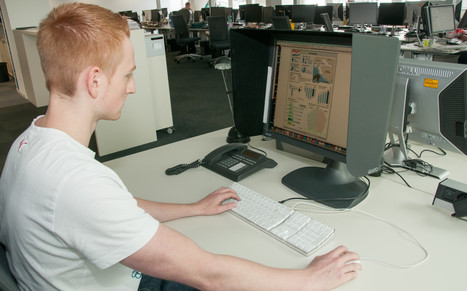


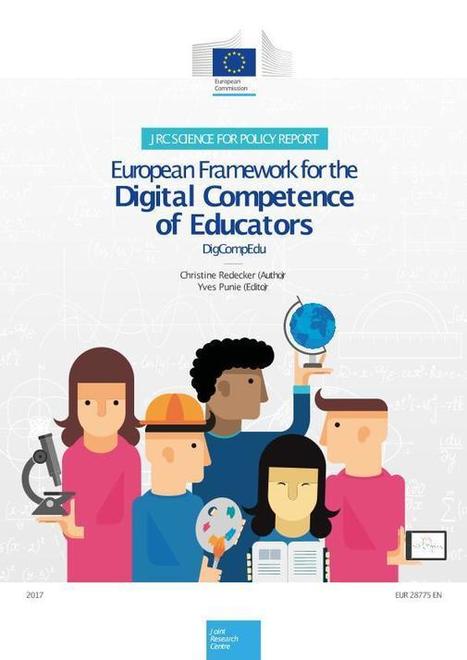


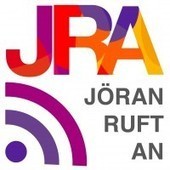

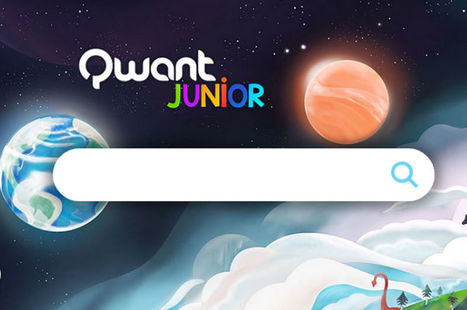
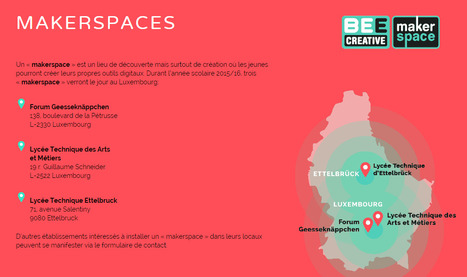



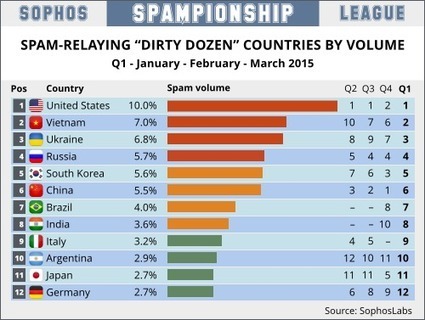

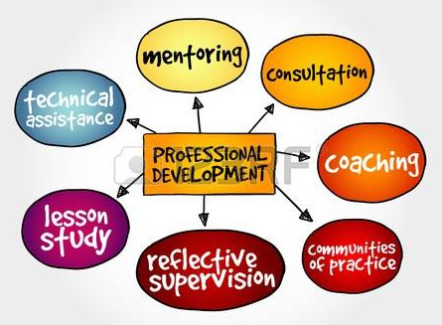
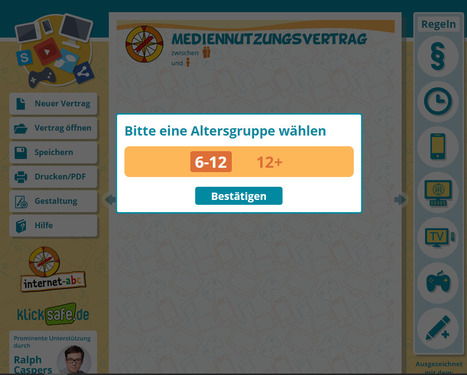
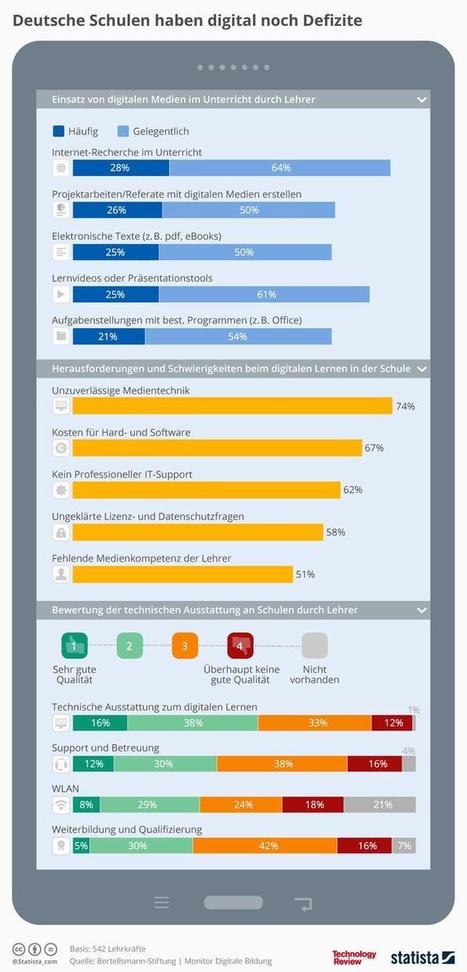

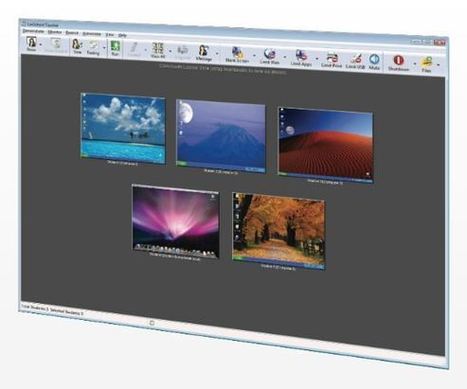

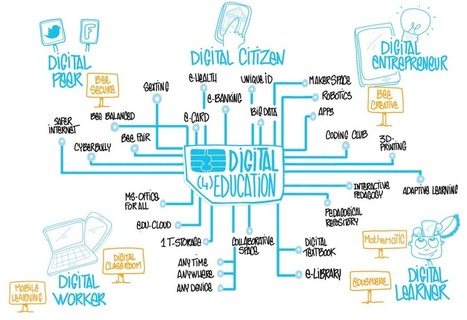
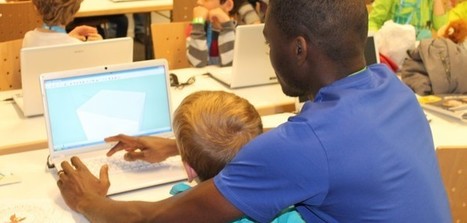







Ist die klassische Berufsausbildung überholt? Um die Ausbildung flexibler gestalten zu können, könnten 36 Level statt drei Ausbildungsjahre eingeführt werden.
Die Digitalisierung erhält immer schneller Einzug in die Ausbildungswelt. Azubis können sich ihre Arbeitsanweisungen mittlerweile aus der Cloud ziehen, Maschinen schon lange mit Tablets bedienen und in sozialen Netzwerken lernen. Und auch die Berufsbilder bleiben vom digitalen Wandel nicht unberührt. Doch nicht allen geht die Transformation von alter zu neuer Ausbildungswelt schnell genug.
Das neue Ausbildungsjahr beginnt zumindest schon ganz im Zeichen der Digitalisierung. Zum 1. August können sich junge Menschen bundesweit erstmals zum Online-Händler ausbilden lassen. "Kaufmann/Kauffrau für E-Commerce" heißt das neue Angebot offiziell. Es soll eine Antwort auf den seit langem boomenden Onlinehandel sein. Eine Antwort, die zehn Jahre zu spät kommt, kritisieren Experten denn auch – und wünschen sich mehr Schnelligkeit in Sachen Digitalisierung. Nichts anderes als die Zukunftsfähigkeit Deutschlands stehe auf dem Spiel.
"Die Ausbildung kommt nicht zehn Jahre zu spät, sondern genau rechtzeitig", sagt dagegen der Vizechef des Bundesverbands E-Commerce und Versandhandel Deutschland, Martin Groß-Albenhausen. Weil sie Fachkräfte forme, die vielleicht das "nächste große Ding im Handel" umsetzen würden. "Wir haben einen Beruf geschaffen, bei dem wir am ersten Tag der Ausbildung jedem Azubi sagen, dass er am Ende der drei Ausbildungsjahre vermutlich einiges, was er in den ersten Monaten lernt, nicht mehr anwenden wird." Der Handelsverband Deutschland geht von mehr als 1000 Onlinehandel-Azubis in diesem Jahr aus.
Learn more / En savoir plus / Mehr erfahren:
https://www.scoop.it/t/21st-century-learning-and-teaching/?&tag=rubric